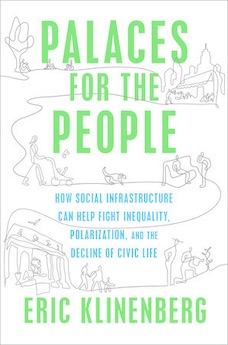By David Madden
Starting in 1903, steel magnate Andrew Carnegie financed the building of 1,689 libraries throughout the United States, calling them “Palaces for the People.”
Taking that phrase for the title of his book, Eric Klinenberg articulates the many ways in which libraries in the past and the present are major examples of his innovative concept “social infrastructure: the physical places and organizations that shape the way people interact.” His definition and description of the term contrasts with the familiar concept of “infrastructure” as “what engineers and policy makers refer to as hard or physical infrastructure: large-scale systems for transit, electricity, gas, oil…sewage, water,” etc. Add tailgate markets.
Klinenberg’s examples of social infrastructure are lucid and comprehensive, embracing a great majority of places, in addition to libraries, where people interact, including schools, playgrounds, athletic fields, swimming pools, sidewalks, community gardens, to list only a few. Free and relatively safe, they historically have fostered the dynamic realities that constitute community. Klinenberg eloquently argues that public perception and attitude together with inadequate funding impede further development of those places as powerful contributors to solutions for our worsening problems as a society: division, isolation, crime, addiction, even climate change.
He frequently enriches his claims with long testimonials and anecdotes about people he has interviewed who use public places.
For contrast, he describes public places that are less conducive to social activities, such as bars, commuter trains, movie theaters, and restaurants. Starbucks, for instance, is too costly for many people and restrictive as to length of stay and customer interaction.
In 1951, I wrote “Imprisoned Light,” my first published short story, set in my hometown library. Taking refuge from a snowstorm, a homeless man becomes so deeply immersed in Alice In Wonderland that he steals the book as a treasure.
Deliberately visiting main libraries and talking with librarians in major cities in North Carolina where I live, I have learned that on the busiest days visitors are homeless folks almost exclusively. Quite clearly, Klinenberg’s recommendations for change could transform such libraries into palaces for all the people, as in the past. Like Klinenberg, I have discovered that branch libraries, on the other hand, are already places where conditions he eloquently advocates are vibrantly active, providing models for other places in the social infrastructure.
Author most recently of Marble Goddesses and Mortal Flesh, David Madden (ΦBK, University of Tennessee, 1979) is at work on an innovative biography of James M. Cain, a memoir of his army troubles during the McCarthy era, and an impressionistic biography of his mother.




